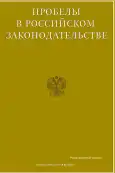Peculiarities of Recruiting Women into Terrorist Groups on the Territory of the Russian Federation
- 作者: Ashkhotova L.A.1
-
隶属关系:
- North Caucasus Institute for Advanced Studies (branch) of the Krasnodar University of the Ministry of Internal Affairs of Russia
- 期: 卷 15, 编号 4 (2022)
- 页面: 159-163
- 栏目: Articles
- URL: https://journal-vniispk.ru/2072-3164/article/view/147547
- ID: 147547
如何引用文章
详细
作者简介
Liana Ashkhotova
North Caucasus Institute for Advanced Studies (branch) of the Krasnodar University of the Ministry of Internal Affairs of Russia
Email: vip.ashkhotova@mail.ru
Police Senior Lieutenant, Senior Lecturer of the Department of Organization of Law Enforcement Nalchik, Russia
参考
- Ayupov R.F. Peculiarities of recruiting women into international extremist organizations // International Journal of the Humanities and Natural Sciences. 2022. No. 1-2. pp. 48-51.
- Buraeva L.A. On methods of recruiting women by terrorist organizations through the Internet // Gaps in Russian legislation. 2018. No. 5. S. 190-193.
- Goryunov A.P. Religious manipulation of Russian wives during recruitment into Islamic international terrorist organizations // Scientific Bulletin of the Omsk Academy of the Ministry of Internal Affairs of Russia. 2021. V. 27. No. 1 (80). pp. 84-88.
- Karimova G., Seidumanov S., Kutsenko O. IS Women Recruits: Migration and Values, Needs and Images // Central Asia and the Caucasus. 2021. V. 24. No. 1. S. 133-148.
- Kochnev A.V. The image of a woman and her role in religious Islamic terrorism on the territory of the Russian Federation (2000 - to the present) // History and modern worldview. 2020. No. 4. S. 63-71.
- Mayatskaya O.B. The phenomenon of gender terrorism: a socio-philosophical view // Eurasian legal journal. 2020. No. 11 (150). pp. 526-527.
- Novikova O.N. Terrorism in the shadow of a pandemic // APE. 2022. No. 1 (113). pp. 180-198.
- Khvalei A.A. Women and children as the subject and object of "Information Jihad" (on the example of the "Islamic State" propaganda campaign) // Questions of national and federal relations. 2021. Vol. 11. No. 9 (78). S. 1662-2669.
补充文件








